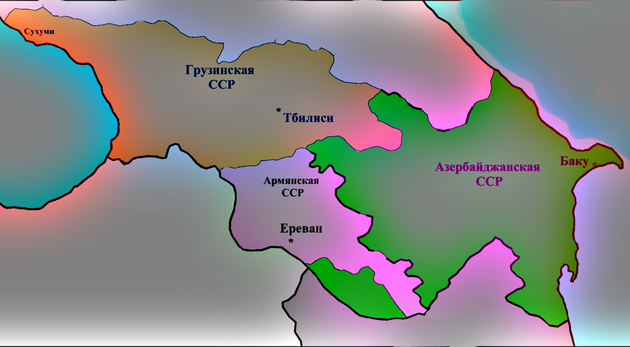The idea of uniting the South Caucasus into a political union arose almost immediately after the collapse of the USSR. The cultural closeness of the peoples of Armenia, Georgia and Azerbaijan in the early 1990s was not questioned, although nationalist rhetoric was already becoming fashionable. Then the historical community, the desire to preserve and enhance the legacy of the Soviet Union, which would be more difficult for the three republics to achieve separately, did not seem to be something illusory. No one wanted to create obstacles to free trade and movement of citizens of all countries in the region.
In the first decade since the collapse of the USSR, there were many integration projects. Attempts were made to unite within the framework of the Confederation of the Peoples of the Caucasus, the Caucasian Common Market (which was based on the model of the European Common Market), and the Caucasian Common House. The greatest interest in the forms of regional integration was shown by the politicians of post-Soviet Georgia. The first president of the republic, Zviad Gamsakhurdia, supported the project of the "Confederation of the Peoples of the Caucasus", then Eduard Shevardnadze said that it would be easier to maintain the sovereignty of the South Caucasian countries through joint efforts, rather than separately. In 2010, the disgraced President Mikheil Saakashvili spoke about the need to unite the region from the rostrum of the UN General Assembly.
At the same time, the new policy made popular the nationalist principles of state-building; pseudo-scientific concepts of "historical injustice" and "historical conspiracy" became widespread, the overcoming of which became possible only after the republics gained independence. The cultural paradigm has been simplified as much as possible. The idea of internationalism was replaced by a "heroic past," which removed all responsibility for the acts committed in the past. The dubious biographies of individual historical figures have been idealized over time, since they met the nationalist needs.
The foreign policy prospects of the countries of the South Caucasus, which did not intersect with each other by the mid-1990s, also prompted one to be skeptical about the idea of a regional union. Azerbaijan has implemented them best of all, relying on the economic strength of its energy sector. The "Contract of the Century" signed in 1994 allowed the republic to realize the potential of the guarantor of Europe's energy security. Armenia staked on strengthening diaspora structures, hoping to become the center of the fragmented Armenians. The occupation of the territories of Azerbaijan by Armenia served as a demonstration of the "successes" of regional separatism, satisfying the ideological request of the nationalists to become the curators of the national policy of the entire diaspora. Since the second half of the 1990s, Georgia has taken a confident course towards the development of European integration, although until 1996 many in Tbilisi thought that the key to resolving the Georgian-Abkhaz conflict was in Moscow.
The actualization of the ethnic factor at the time of the collapse of the Soviet Union stimulated the activity of the regional post-Soviet criminals, which had a destructive effect on the internal politics of the region. Since the politicians of the new era did not have the opportunity to receive support from the already former Soviet nomenklatura, some resorted to the services of criminal structures that were interested in the privatization of Soviet property. For some politicians, this tactic turned into a career collapse, since the local criminals never shared the political views of individual enthusiasts. The renaissance of the activities of members of the former Communist Party, the Komsomol activists, led to the formation of a faceless bureaucracy. Criminal capital, which at the end of the 1990s was converted into political dividends.
In addition, the idea of integrating the South Caucasus was not popular outside the region (with the exception of Russia). In the West, attention was paid exclusively to economic integration in order to create a system in the region that would link Europe with the Asia-Pacific region. For Western countries, the post-Soviet South Caucasus seemed to be the focus of all sorts of problems, for the solution of which European and American analysts did not develop the necessary methodological base.






